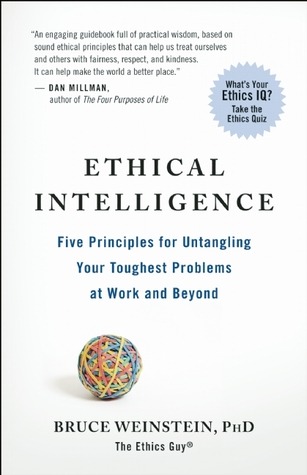Ethical Intelligence Summary

5 min read ⌚

Five Principles for Untangling Your Toughest Problems at Work and Beyond
We live in times of lesser moral values and no ethical intelligence. Not only that we are neglecting them, but also people think of them as additional – a useless survival tool. Every once in a while, non-ethical individuals make a grand entrance into the business world, due to the lack of these principles.
You are probably not too convinced of the idea, to apply “Ethical Intelligence” laws because the community has taught us otherwise.
This summary showcases the benefits, and gains from such an approach.
Who Should Read “Ethical Intelligence”? And Why?
We recommend Weinstein’s masterpiece for two reasons. First, ethics is being crushed by “more important” matters that bring us sorrow. Therefore, we must think of a way to reduce this ignorance existing among the people.
Second, this thoughtful guide is a powerful tool for all people tired of the corruption that has ripped our society apart. If you insist on rebuilding trust, and competence in your workplace, “Ethical Intelligence” would do the job.
About Bruce Weinstein
 Bruce Weinstein is an American-born leadership expert, ethicist, and a well-known figure. He started this ethical journey at 25 years of age, by writing “Ethics in the Hospital Settings”. Later on, Bruce continued walking down the same road, conducting extensive researches and writing a few more books.
Bruce Weinstein is an American-born leadership expert, ethicist, and a well-known figure. He started this ethical journey at 25 years of age, by writing “Ethics in the Hospital Settings”. Later on, Bruce continued walking down the same road, conducting extensive researches and writing a few more books.
“Ethical Intelligence Summary”
The society often sidesteps ethics for personal benefits and short-term gain. In this book, we will embark on a journey and try to solve this problem with Bruce Weinstein ingenuity and lucid guidebook. People are often forced to avoid the ethical principles due to the restrictions embedded in our community. However, that’s not a valid excuse, and thus you are now challenged to question your methods of getting what you want.
Here’s how you can start:
Apparently, this is not the full package, but it’s a good start. Remember the last time; you’ve done something playing only with the right cards.
One might be wondering: Are there any others?
“Ethical Intelligence” covers aspect forgotten by the nations, religions, families, and people. Many of you would quickly jump to defend your personal background, but let’s take a moment to analyze the situation. Bruce’s intentions are not to be vague, but clear and understandable. In fact, he underlines five essential, universal and moral principles.
Let’s briefly discuss the five core principles developed by Bruce, to put “Ethical Intelligence” to the test:
- “Some replica of the Bible, if you can’t help, the least you can do is step aside” – This is often like a life-manual for the people involved in medicine, who are taught to stick to what they know. The reason for doing so is – trying not make matters worse, known as the “principle of noninterventionism”.
- “The next step is a test of your expertise, an attempt to fix things” – Remember helping is not considered beneficial if you are doing it at the expense of your peace and well-being. This is not a suggestion; it’s must-do in order to exploit your potential fully. You are a masterpiece, no doubt, but you must stay true to yourself and give your needs a priority. Only afterward, you are qualified to take care of others and offer your knowledge as a gesture of goodwill.
- “Give respect, and expect nothing in return” – We are often blinded by the rule – I am treating everyone, in the same way, they treat me. However, the wisdom expands beyond this shallow perspective. The Golden Law” implies – Do to others as you would have them do to you. It’s correct to consider every person’s opinion and don’t interfere with how they perceive the world.
When people feel gratitude, and satisfaction towards them, as a sign of respect, they want immediately to return the favor.
- “Be impartial and fair in any situation” – Being fair means is not merely a thought of low value. Although life brings us whatever we order, you should give people more than they deserve. This strategy will provoke a life-altering mindset with strong principles to rise from the ashes and overthrow the self-centered ego.
The crowd thinks that the politics is a perfect example of immorality and lack of principles. The people actually give them the power, leading to a conclusion that this is 100% an unacceptable accusation. Let’s cut to the chase and return to more entrepreneurial matters.
You can start with gentle words, and suggest how the person contribute more in order to expand professionally. Afterwards, you can go into details and explain your intentions.
Key Lessons from “Ethical Intelligence”
1. Show your interpersonal abilities
2. Don’t rely on judgments
3. Try not to hurt people
Show your interpersonal abilities
Discussions and arguments can generate heat and bad blood among the co-workers, especially if they are not properly supervised. Don’t waste time trying to enter their heads, but act as a guide to avoid any unnecessary polemics. Instead, do your job, share your opinion and remain impartial.
Don’t rely on judgments
If you offer critiques, make sure that the tone is in tune with the point you are trying to showcase. The goal is not to demonstrate your superiority but to help people improve, and grow professionally. In other words, your judgment skills must be backed by interpersonal abilities to maximize the effect of your remark.
Try not to hurt people
Love is not supposed to be easy and beautiful but full of drama and quarrels. This irony is a reflection of how we treat one another. For instance, if you must break up with your partner, try to do it in the most harmless way possible. In any case, you should avoid being the drama queen, or drama king.
Like this summary? We’d Like to invite you to download our free 12 min app, for more amazing summaries and audiobooks.
“Ethical Intelligence” Quotes
Ethics isn’t just about how you treat other people. It’s also about how you treat yourself. Share on X When you’ve been treated wrongly and the stakes are high, it is...essential to respond with ethical intelligence. Share on X How you give unpleasant news usually determines how it will be taken. Share on X The term multitasking suggests that it’s possible to do several worthwhile things at the same time, but emerging evidence suggests that this is a fantasy because our brains are built to monotask. Share on X To be fully human, it’s not enough to have emotional intelligence. We need ethical intelligence, too. Share on XOur Critical Review
Experts agree that his phrases become a little irrelevant from time to time, other than that, you may find these several, ethical exercises and principles quite amusing. You’ll never know what lies ahead until you rub your nose with it. Anyone can feel free to disagree and design its own set of moral norms, and laws.








